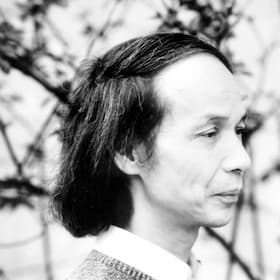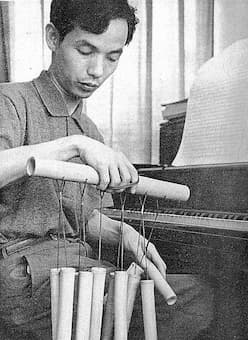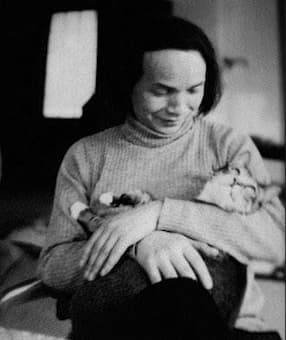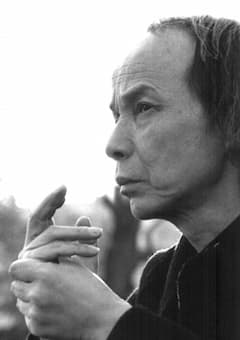
Tōru Takemitsu
On 20 February 1996, while undergoing treatment for abdominal cancer, Tōru Takemitsu died at the age of sixty-five. He had been diagnosed mid-1995, and “by October the disfiguring side-effects of the medical treatments were pronounced.” Takemitsu became increasingly weak and unable to attend performances. In addition, he discontinued work on a projected opera. In mid-February 1996 he was taken to a hospital in the Minato Ward of Tokyo, and he died at 1:15 pm on the afternoon of 20 February. The funeral was held on the afternoon of February 29, and the “widespread sense of loss in the Japanese musical community was but slightly expressed by music commentator Takashi Tachibana’s uncontrolled tears during his interview on NHK television.” In the summer of 1996 a colleague composed a viola concerto in his memory, and Takemitsu was honored as the most important composer in Japanese music history. He was credited as the “first Japanese composer fully recognized in the West, while remaining the guiding light for a younger generations of Japanese composers.”
Tōru Takemitsu: “Rain Coming”
 His acceptance in the West, however, was a gradual process. Initially, some commentators “described him as an artist of a decorative type, purveyor of atmospheric wisps of sound.” For all intent and purposes, the sensuousness of Takemitsu’s music had made a somewhat distracting impression on a number of critics. His music was known for its rich and opulent chords, “luminous textures, exotic tones that almost brush the skin, hazy melodies that move like figures in the mist… Yet the picture-book atmosphere is periodically disrupted by harsh timbres, rumblings of dissonance, engulfing masses of tones. Loveliness vanishes into darkness before it can be fully apprehended.” The composer responsible for bringing Takemitsu to the attention of Western audiences had been Igor Stravinsky. Stravinsky was in Japan in April and early May of 1959, conducting a series of rehearsals and concerts in Tokyo, Kyoto, and Osaka. Stravinsky asked to hear some Japanese orchestral works, and the NHK Symphony Orchestra organized a hearing.
His acceptance in the West, however, was a gradual process. Initially, some commentators “described him as an artist of a decorative type, purveyor of atmospheric wisps of sound.” For all intent and purposes, the sensuousness of Takemitsu’s music had made a somewhat distracting impression on a number of critics. His music was known for its rich and opulent chords, “luminous textures, exotic tones that almost brush the skin, hazy melodies that move like figures in the mist… Yet the picture-book atmosphere is periodically disrupted by harsh timbres, rumblings of dissonance, engulfing masses of tones. Loveliness vanishes into darkness before it can be fully apprehended.” The composer responsible for bringing Takemitsu to the attention of Western audiences had been Igor Stravinsky. Stravinsky was in Japan in April and early May of 1959, conducting a series of rehearsals and concerts in Tokyo, Kyoto, and Osaka. Stravinsky asked to hear some Japanese orchestral works, and the NHK Symphony Orchestra organized a hearing.
Tōru Takemitsu: Requiem for Strings
 Takemitsu had submitted his Requiem for Strings to the program organizers two years earlier, who had declined to include it in the session. However, the Takemitsu score and parts had not been removed from the orchestra folders, and the orchestra inadvertently began playing the work at the audition with Stravinsky listening. The conductor apparently noticed the mistake, and stopped the orchestra, but Stravinsky asked him to continue. In the news conference, Stravinsky mentioned Takemitsu by name and commented on the passionate intensity of the piece. Takemitsu’s reputation soared following Stravinsky’s remark, and once Stravinsky had returned home to Los Angeles, he mentioned his name to other concert organizers. As a result, California became one of the first places overseas where the music of Takemitsu was performed with some frequency.” Marked by his experiences after the war, Takemitsu long shunned any and all associations with Japanese music of his native country. However, witnessing a performance of traditional Japanese puppet theatre, in addition to an encounter with John Cage, led him “to recognize the value of my own tradition.”
Takemitsu had submitted his Requiem for Strings to the program organizers two years earlier, who had declined to include it in the session. However, the Takemitsu score and parts had not been removed from the orchestra folders, and the orchestra inadvertently began playing the work at the audition with Stravinsky listening. The conductor apparently noticed the mistake, and stopped the orchestra, but Stravinsky asked him to continue. In the news conference, Stravinsky mentioned Takemitsu by name and commented on the passionate intensity of the piece. Takemitsu’s reputation soared following Stravinsky’s remark, and once Stravinsky had returned home to Los Angeles, he mentioned his name to other concert organizers. As a result, California became one of the first places overseas where the music of Takemitsu was performed with some frequency.” Marked by his experiences after the war, Takemitsu long shunned any and all associations with Japanese music of his native country. However, witnessing a performance of traditional Japanese puppet theatre, in addition to an encounter with John Cage, led him “to recognize the value of my own tradition.”
Tōru Takemitsu: “Sakura”
 During a lecture at Columbia University, Takemitsu explained, “When I decided to be a composer I wasn’t interested in my own tradition. Then, by chance, about ten years later after I began studying Western music, I came to realize the value of Japanese music… I began to realize the differences between West and East. At the time that I wrote “November Steps” it was very difficult to make a blending of both of them at once… For the most part I juxtaposed the Japanese instruments and Western instruments… Now my concern is mostly to find out what there is in common.” And in a lecture at Suntory Hall in Tokyo Takemitsu added, “I have a love-hate relationship with traditional Japanese music… I have not tried to blend traditional Japanese music and European music. I would be lying if I tried to say my music is not affected by traditional Japanese music, however, in my experience, whenever I showed interest in traditional Japanese music in my composing, things became difficult for me in my composition. Conflicts develop between the two; but I try to benefit from the conflicts.” As he once remarked, “I would like to develop into two directions at once, as a Japanese in tradition and as a Westerner in innovation.”
During a lecture at Columbia University, Takemitsu explained, “When I decided to be a composer I wasn’t interested in my own tradition. Then, by chance, about ten years later after I began studying Western music, I came to realize the value of Japanese music… I began to realize the differences between West and East. At the time that I wrote “November Steps” it was very difficult to make a blending of both of them at once… For the most part I juxtaposed the Japanese instruments and Western instruments… Now my concern is mostly to find out what there is in common.” And in a lecture at Suntory Hall in Tokyo Takemitsu added, “I have a love-hate relationship with traditional Japanese music… I have not tried to blend traditional Japanese music and European music. I would be lying if I tried to say my music is not affected by traditional Japanese music, however, in my experience, whenever I showed interest in traditional Japanese music in my composing, things became difficult for me in my composition. Conflicts develop between the two; but I try to benefit from the conflicts.” As he once remarked, “I would like to develop into two directions at once, as a Japanese in tradition and as a Westerner in innovation.”
For more of the best in classical music, sign up to our E-Newsletter
Tōru Takemitsu: “November Steps”

Thank-you for writing about Tōru Takemitsu. I had never heard of him, so I am glad I chanced upon your article. He certainly deserves to be heard more. What a tragedy that he died at a relatively young age for the present day.
What absolutely beautiful music. I had never heard of him either and I am a composer. Stunning sounds.